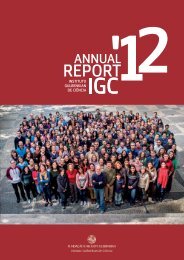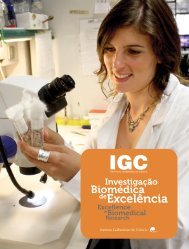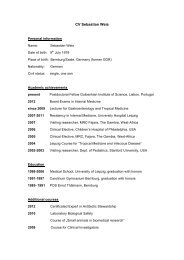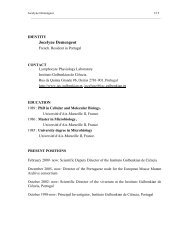organisation - the Instituto Gulbenkian de Ciência
organisation - the Instituto Gulbenkian de Ciência
organisation - the Instituto Gulbenkian de Ciência
- No tags were found...
Create successful ePaper yourself
Turn your PDF publications into a flip-book with our unique Google optimized e-Paper software.
LUPUS<br />
AND AUTOREACTIVE<br />
IMMUNE REPERTOIRES<br />
Constantin Fesel Research Fellow<br />
PhD in Immunology, Université Paris VI, 1998<br />
Post-doctoral Fellow, Weizmann Institute of Science, Rehovot<br />
Principal Investigator at <strong>the</strong> IGC since 2001<br />
While <strong>the</strong> <strong>de</strong>tection of molecular mechanisms as well as of genetic disease risk<br />
factors rapidly evolves, <strong>the</strong> systemic diversification of specificity repertoires is<br />
still badly un<strong>de</strong>rstood. In this situation, it is increasingly relevant to mo<strong>de</strong>l <strong>the</strong><br />
pathogenetic process that leads to autoimmune diseases as a whole, since <strong>the</strong>y<br />
are known to <strong>de</strong>pend on complex interactions of molecular and cellular mechanisms.<br />
Systemic Lupus Ery<strong>the</strong>matosis (SLE) is a human autoimmune disor<strong>de</strong>r<br />
where altered physiologies and self-reactive repertoires of both B- and T-cells<br />
are intimately connected. Our approach is to mo<strong>de</strong>l, in a stepwise fashion, <strong>the</strong><br />
ways in which genetic factors and molecular mechanisms are interconnected.<br />
Since we found particular relations between antibody reactivity and regulatory<br />
T-cells in unaffected relatives of SLE patients who often share SLE-associated<br />
autoantibodies, our hypo<strong>the</strong>sis is that <strong>the</strong>se autoantibody-positive relatives<br />
bear a particular capacity to regulate autoimmune reactions.<br />
GROUP MEMBERS<br />
Nuno Costa (Research Technician)<br />
Sandra Iris Godinho (Masters stu<strong>de</strong>nt)<br />
COLLABORATORS<br />
Maria Berta Silva Martins (<strong>Instituto</strong> <strong>de</strong> Ciências Biomédicas Abel Salazar,<br />
Porto, Portugal)<br />
Carlos Vasconcelos (Hospital Geral <strong>de</strong> Santo Antonio, Porto, Portugal)<br />
Margarida Lima (Hospital Geral <strong>de</strong> Santo Antonio, Porto, Portugal)<br />
Cristina João (Centro <strong>de</strong> Investigação <strong>de</strong> Patologia Molecular, Lisboa,<br />
Portugal)<br />
Carlos Ferreira (Hospital <strong>de</strong> Santa Maria, Lisboa, Portugal)<br />
Maria Francisca Fontes (Hospital Curry Cabral, Lisboa, Portugal)<br />
José Alves (Hospital Fernando Fonseca, Amadora-Sintra, Portugal)<br />
FUNDING<br />
Fundação para a Ciência e Tecnologia (FCT), Portugal<br />
LUPUS AND ITS COMPENSATION IN UNAFFECTED RELATIVES<br />
BY T-CELL REGULATION<br />
SLE is an autoimmune disease characterised by autoantibodies that accumulate<br />
over years before clinical manifestation. Unaffected relatives of SLE patients<br />
frequently share SLE-type autoantibodies, most without ever acquiring clinical<br />
disease, which suggests a capacity to compensate pathogenic effects associated<br />
with <strong>the</strong>m. A <strong>the</strong>rapy that is able to restore such compensation appears<br />
highly <strong>de</strong>sirable. Conversely to reported negative correlations of regulatory T-<br />
cells with circulating IgG autoantibodies in patients, we found <strong>the</strong>m positively<br />
correlated in unaffected relatives. Fur<strong>the</strong>rmore, autoantibody profiles were influenced<br />
by genetic polymorphisms affecting effects mediated by IL2, <strong>the</strong> cytokine<br />
with <strong>the</strong> strongest impact on Treg function in characteristic ways. We<br />
hypo<strong>the</strong>sise that an IL2-<strong>de</strong>pen<strong>de</strong>nt regulatory feedback mechanism, abrogated<br />
in manifest SLE, can control <strong>the</strong> pathogenicity of SLE-type antibody production.<br />
We are now characterising this mechanism. Data analysis is in progress<br />
Scheme of SLE pathogenesis according to current knowledge, with <strong>the</strong> role of<br />
regulatory T-cells indicated.<br />
Cytogramme with subsets of conventional and regulatory T-cells.<br />
IGC ANNUAL REPORT ‘11<br />
RESEARCH FELLOWS<br />
74






